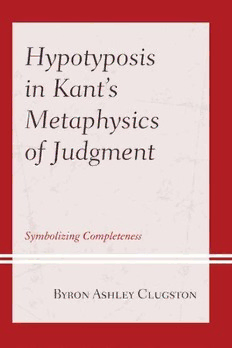
Hypotyposis in Kant’s Metaphysics of Judgment : Symbolizing Completeness. PDF
Preview Hypotyposis in Kant’s Metaphysics of Judgment : Symbolizing Completeness.
Hypotyposis in Kant’s Metaphysics of Judgment Contemporary Studies in Idealism Series Editor: Paolo Diego Bubbio, Western Sydney University Editorial Board: Mark V. Alznauer (Northwestern University), Francesco Berto (University of St. Andrews), Alfredo Ferrarin (University of Pisa), Elena Ficara (Uni- versity of Paderborn and City University of New York), George di Giovanni (McGill University), Douglas Hedley (Cambridge University), Stephen Houlgate (University of Warwick), Wayne Hudson (Charles Sturt University), Luca Illetterati (University of Padua), David Kolb (Bates College), Simon Lumsden (UNSW), Douglas A. Moggach (University of Ottawa), Lydia Moland (Colby College), Maurizio Pagano (University of Eastern Piedmont), Paul Redding (The University of Sydney), Julian Young (Wake Forest University) The Contemporary Studies in Idealism series features cutting-edge scholarship in the field of classical German Idealism and its legacy. “Idealism” is considered both in a his- torical and in a theoretical sense. The series features projects that center upon Kant and the post-Kantian Idealists (including, but not limited to, early German romantic thinkers Fichte, Schelling, and Hegel) or upon other related forms of nineteenth-century philoso- phy—including those often considered to oppose Idealism, such as those of Kierkegaard and Nietzsche. The scholarship also seeks to critically assess the legacy of Idealism in the twentieth and twenty-first century. The series uses the resources of classical German Idealism to engage in contemporary debates in all subfields of philosophy. Hypotyposis in Kant’s Metaphysics of Judgment: Symbolizing Completeness, by Byron Ashley Clugston Kant and Mysticism: Critique as the Experience of Baring All in Reason’s Light, by Stephen R. Palmquist Hypotyposis in Kant’s Metaphysics of Judgment Symbolizing Completeness Byron Ashley Clugston LEXINGTON BOOKS Lanham • Boulder • New York • London Published by Lexington Books An imprint of The Rowman & Littlefield Publishing Group, Inc. 4501 Forbes Boulevard, Suite 200, Lanham, Maryland 20706 www.rowman.com 6 Tinworth Street, London SE11 5AL, United Kingdom Copyright © 2019 The Rowman & Littlefield Publishing Group, Inc. Excerpts from Kant, Immanuel. Critique of Pure Reason. Trans. Paul Guyer and Allen Wood. Cambridge: Cambridge University Press, 1999. Reproduced with permission of Cambridge University Press through PLSclear. All rights reserved. No part of this book may be reproduced in any form or by any electronic or mechanical means, including information storage and retrieval systems, without written permission from the publisher, except by a reviewer who may quote passages in a review. British Library Cataloguing in Publication Information Available Library of Congress Cataloging-in-Publication Data Available ISBN: 978-1-7936-0515-3 (cloth : alk. paper) ISBN: 978-1-7936-0516-0 (electronic) ∞ ™ The paper used in this publication meets the minimum requirements of American National Standard for Information Sciences—Permanence of Paper for Printed Library Materials, ANSI/NISO Z39.48-1992. Para mi Sorayita Contents Preface ix Introduction xiii I Schematic and Symbolic Hypotyposis 1 II Ordinary Examples, Exemplary Symbols 19 III Structures of Conceptual Determination 43 IV Imagining the Rational 83 Conclusion 107 References 113 Index 117 About the Author 125 vii Preface The relish with which Michael Dummett justified his writing a certain kind of Preface for his masterpiece on Frege1 prompts me to say a little about the processes, external and internal, this work has passed through. In concert with him, the hope here is that such an indulgence is a welcome pre-prandial chitchat, a prolegomenon to the main dish, and a helpful elucidation of the motivations behind cooking it up. Though the draft manuscript was written in Mexico City during late 2015 and early 2016, I first began sketching thoughts on the topics found here in Sydney in January 2015, having been refreshed by a post-PhD overseas journey during which Stanley Cavell’s philosophical music first touched my ears.2 I had submitted my doctoral thesis on Kant and Hegel in August 2013 and escaped Sydney from December of that year to August of the following. During the trip I found the eight-month marking process for my thesis had come to an end and that I would be required to make some minor amend- ments to the text. Upon rewriting some bits and adding others I realised a first reading of The Claim of Reason had permanently changed my sense of the hopes and possible achievements of philosophy, and had opened up to me fresh ways of conceiving of topics I had been at work on during my doctorate. In addition to this, I would thank the reviewers of my thesis, Angelica Nuzzo, Chris Yeomans, and Simon Lumsden, for their generous and helpful com- ments; these also gave me guidance in reframing my thoughts. And, begin- ning from a period which stretches even farther back, I cannot fail to mention the splendid mentorship of Paul Redding of which I had the privilege: without his support, insight, patience, and friendship, I would be in a much worse position than I am, philosophically and otherwise. The early sketches for the present work began with an eye on issues from my doctorate that seemed worthy of further treatment in connection with one ix
